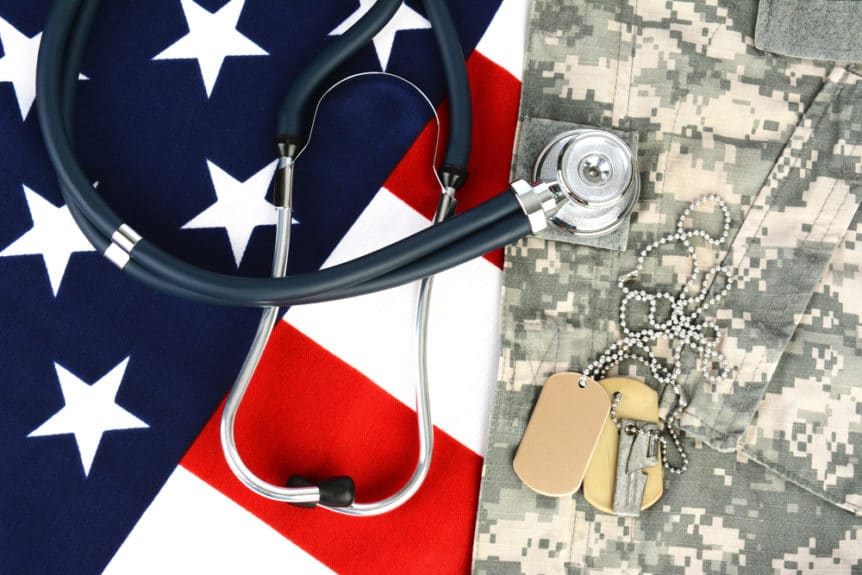How telehealth is helping American Veterans battle mental health issues
Thank you for joining us in our second edition of ‘Telehealth Serves America’. In this blog post, we will discuss one of America’s most valued and distinguished groups—Veterans. Veterans have valiantly served and protected our country. After being exposed to the traumas of wartime and enlistment, many veterans are left with physical and psychological scars. Telehealth is paving new roads to help veterans navigate life after service and reintegration.
PTSD and So Much More
When most people think about the disorders and issues that concern our veterans, PTSD is the often the first thing that comes to mind. PTSD, or Post Traumatic Stress Disorder, is a psychiatric disorder that can occur in people who have experienced or witnessed a traumatic event. PTSD has been known by many names throughout history, including “shell shock” and “combat fatigue”. However, PTSD has only been well-documented since The Vietnam War. In other words, veterans who served as far back as World War II have gone undiagnosed and untreated for decades. As a result, generations of veterans that have not received the care they need. Despite being the most well-known affliction, PTSD is still incredibly underdiagnosed. It is important to reach out to a healthcare provider if you believe that you may be experiencing PTSD, as symptoms often worsen without treatment.
And PTSD isn’t the only illness that veterans live with. The stresses of wartime and enlistment can leave our service men and women with lasting mental health disorders. These disorders include depression, anxiety, Traumatic Brain Injuries (TBIs), Substance Abuse Disorders (SADs), survivor’s guilt, suicidal thoughts, and much more. A study done in 2018 showed that an average of twenty veterans commit suicide each day in America. Veterans are also one-and-a-half times more likely to commit suicide than non-veterans. Many people don’t realize that the largest battles occur when our veterans return home from active duty. Telehealth offers treatment and support for a multitude of mental health concerns surrounding veterans.
Help Available Any Time, Anywhere
Telehealth is one of The Department of Veterans Affairs (VA)’s “transformational initiatives” that helps provide accessible and efficient healthcare to our veterans. In a study conducted by VA, evidence showed that with the use of Telemental healthcare, Acute Psychiatric VA bed days were reduced by 39%. Subsequently, VA hospital admissions went down by 32% when patients had access to telemental healthcare. Thanks to telehealth, hospital admissions and psychiatric admissions have greatly reduced in the veteran population.
1 out of every 4 veterans in the United States lives over 40 miles from the nearest VA facility. Therefore, implementing the convenience of home telehealth can be life-changing. Telehealth can provide healthcare and talk therapy from any place with an internet connection, including your home. Thus, veterans now have telehealth access from their personal computers, tablets, and even their phones. For patients with mobility concerns, such as veterans with physical injuries from war, telehealth is an incredibly useful tool because they can receive care from the comfort and convenience of home. According to the VA’s website, “Many thousands of Veteran patients are regularly using home telehealth devices to coordinate their care.” And the VA also deems those veterans as “highly satisfied” with their telehealth services.
Through telehealth, veterans can take advantage treatments such as talk therapy and trauma-focused psychotherapy. Talk therapy is extremely beneficial to veterans, as it helps people who are dealing with negative thoughts or emotional distress. It involves talking to a trained professional to help identify those negative thoughts, where they come from, and why they are there. Through talk therapy, veterans can make positive changes in their daily lives that can help them take control and manage their behavior and mood.
Mental Health in Active Military
It is an unfortunate reality, but veterans are less likely than most populations to seek out and receive mental health care. Moreover, active military personnel are even less likely to receive mental health care. This is often due to stigmas surrounding mental health. However, an equally misdirected concern is being unsure of where disclosure of a mental illness leaves service men and women in their careers. In reality, the US Military and the Department of Defense believes that getting help is a sign of strength, and that mental health is just as important as physical health. In addition, disclosure is confidential as the Department of Defense adheres to HIPAA and the Privacy Act. Untreated mental health issues can actually damage your career. Here is some information on disclosure of mental health illness, and your career in the US military.
Telehealth is now being used for our brothers and sisters serving in active military. The United States military has been implementing telehealth on a global scale for years. For example, the military has used telehealth to aid the military in relief missions after natural disasters such as Hurricane Maria in Puerto Rico. Landstuhl Regional Medical Center (LRMC) provides telehealth services to U.S. Army, U.S. Navy and U.S. Air Force service members assigned to over 20 bases in Germany, Italy and Turkey. Telehealth has also been used to monitor active members of the US Navy on their Hospital Ship Mercy.
Please remember that ignoring mental health issues only causes the symptoms to worsen. If you or a loved one is serving in active military and is experiencing mental health issues, please find a list of confidential resources HERE.
Wrapping Up
In conclusion, telehealth is addressing the mental health concerns that have been plaguing our veterans more efficiently and conveniently than ever. Veterans who were previously unable to reach a VA center or a healthcare provider are now able to receive mental healthcare from the convenience of their homes. Telehealth is offering services such as talk therapy, behavioral healthcare, and so much more to America’s veterans.
Please join us in the third edition of the blog series ‘Telehealth Serves America’. We will be discussing the mental health concerns of Teens & Millennials, and how telehealth is bringing the future of healthcare to the future of America.
Resources For Veterans and Active Service Personnel
To learn more about PTSD and treatment options, please visit the VA website HERE.
The Real Warriors Campaign encourages help-seeking behavior among service members, veterans and military families coping with invisible wounds. Please visit their site HERE.
To connect to the Military Crisis Line to chat or text with a confidential responder, call 1-800-273-8255 and press ‘1’ or visit the website HERE.
The National Suicide Prevention Lifeline supports veterans and many aspects of military life and reintegration. Please call 1-800-273-8255, text 838255, or visit the website for a confidential online chat HERE.


